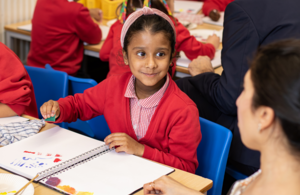Ofsted confirms changes to education inspection and unveils new-look report cards
Today, Ofsted has set out a renewed approach to education inspection that will give parents better and more detailed information, is fairer on professionals, and – crucially – will help raise standards for all children

From November, parents will be given more detail about their children’s education with the introduction of new-look report cards, Ofsted has confirmed today.
- New 5-point grading scale, including the new ‘exceptional’ grade, designed to raise standards, confirmed following support from parents.
- Parents and carers to receive the detailed information about nurseries, schools and colleges they’ve asked for, with strengths and areas for improvement highlighted.
- Schools and colleges with identified areas for improvement to receive additional monitoring inspections, to ensure swift improvements are made.
- Nurseries and childminders to be inspected more frequently, to ensure all children receive the best start in life.
- Disadvantaged and vulnerable children at the heart of reforms, with a focus on ‘inclusion’ in every inspection.
- Increased focus on professionals’ well-being and workload through a more collaborative approach to inspection.
Inspectors will award grades on a 5-point scale across a wider range of areas, providing parents with more granularity and nuance about a provider’s performance and helping to raise standards for children and learners.
The very best practice across early years (EY), schools, further education (FE) and skills, and initial teacher education (ITE) will be recognised with a new ‘exceptional’ grade – indicating other providers could learn from it.
Independent polling from YouGov showed strong parental support for the new approach to grading. Almost 7 out of 10 of parents surveyed said they prefer the new-look report cards to Ofsted’s current inspection reports. Just 15% said they preferred the old system. And nearly 9 out of 10 parents said the report cards are easy to understand.
Following feedback from parents and education professionals, the 5 grades have been renamed ‘urgent improvement’, ‘needs attention’, ‘expected standard’, ‘strong standard’, and the new highest grade of ‘exceptional’.
Read the full consultation response: ‘Improving the way Ofsted inspects education’.
As part of the suite of reforms to raise standards for children and learners, Ofsted has committed to monitoring inspections of schools and FE and skills providers where provision is not currently at the expected standard in all areas. This will ensure that, where areas for improvement are identified, action is taken quickly to raise standards.
In the early years, Ofsted will increase the frequency of inspections from every 6 years to every 4. This increase will be twinned with an enhanced focus on the quality of education and care, ensuring every child is given the best start in life.
Since becoming Chief Inspector, Sir Martyn Oliver has expressed his determination to do more to highlight the experiences of disadvantaged and vulnerable children. Today, Ofsted has confirmed that every education inspection will focus on provision for disadvantaged children, those with a special educational need or disability (SEND), and those who are known to social care – through a specific grade for ‘inclusion’.
The inspectorate has listened carefully to feedback from professionals, making a number of changes and improvements to its proposed approach following consultation.
Importantly, Ofsted has acted on concerns about workload and well-being. Alongside the consultation, Ofsted commissioned an independent review of well-being by Sinéad McBrearty, Chief Executive of Education Support, which is also published today. In response, Ofsted has set out measures to address her recommendations, including adding an additional inspector to school inspections.
Ofsted’s revisions to education inspections will support its core purpose – to inspect schools, early years and education providers objectively, in the best interests of children, their parents and carers – while taking account of the needs and well-being of education professionals. The inspectorate hopes these measures will be welcomed and has committed to continue engaging with parents and professionals, learning from their feedback and listening to constructive criticism to improve.
His Majesty’s Chief Inspector, Sir Martyn Oliver said:
"Ofsted exists to keep children safe and improve their lives.
"Children deserve the best possible education; their parents deserve the best possible information and education professionals deserve to have their work fairly assessed by experts. The changes we are presenting today aim to achieve all 3 of these things.
"Our new report cards will give parents a clearer understanding of the strengths and areas for improvement at the places where their children learn. We will work with the professionals in schools, early years and further education to help them showcase the best of what they do – and help them identify where they can improve."
From: Ofsted
